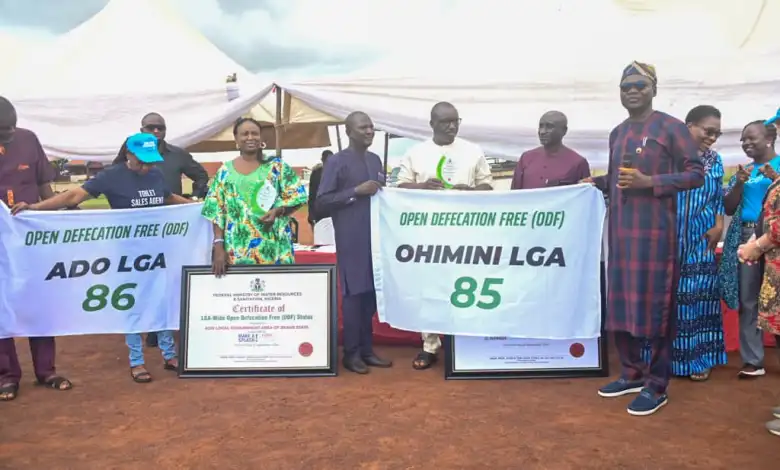The Federal Government, through the Ministry of Water Resources and Sanitation, has reaffirmed its commitment to eliminating open defecation in Nigeria, despite the country still grappling with widespread unsanitary practices. Over 48 million Nigerians currently practice open defecation, the highest figure in Sub-Saharan Africa. In its effort to tackle this crisis, the government has been collaborating with international partners such as UNICEF, which has played a key role in the Clean Nigeria Campaign.
During a keynote address at a ceremony marking the Open Defecation-Free (ODF) status of Ado and Ohimini Local Government Areas (LGAs) in Benue State, the Minister of Water Resources and Sanitation, Dr. Joseph Utsev, highlighted the achievements made through joint efforts. The event, held in Otukpo, Benue State, was an important milestone in Nigeria’s quest to achieve nationwide ODF status. The Minister acknowledged the contributions of UNICEF and its donor partner, LIXIL Funds, in supporting sanitation and hygiene initiatives in the country.
“We recognize UNICEF for its tireless support and the cooperation of all stakeholders at state, local, and community levels, which has been instrumental in driving progress towards eliminating open defecation,” Utsev said. He further praised the Benue State government for its efforts in achieving ODF status in the two LGAs and urged the state to continue working towards sustaining these results.
The Federal Government has made significant progress in improving access to water supply, which has increased from 40% in 1990 to 70% by 2019. However, Dr. Utsev emphasized that improved water supply alone is not enough without corresponding advancements in sanitation and hygiene. He noted that Nigeria’s sanitation access currently stands at 46%, highlighting the need for increased efforts to eliminate open defecation.
The Minister also pointed to several government initiatives aimed at addressing the sanitation crisis. These include the Partnership for Expanded Water, Sanitation, and Hygiene (PEWASH) program, the National Action Plan on the revitalization of the WASH sector, and the Clean Nigeria: Use the Toilet Campaign. He also mentioned the impact of the COVID-19 pandemic, which underscored the importance of access to clean water, sanitation, and hygiene facilities.
In her remarks, Dr. Jane Bevan, Chief of WASH at UNICEF Nigeria, reiterated the organization’s commitment to supporting Nigeria’s efforts to become open defecation-free. “UNICEF is fully committed to the Clean Nigeria campaign, and we will continue to support the government in its mission to ensure sanitation for all,” Bevan said. She also emphasized the importance of long-term behavior change, adding that achieving ODF status is only the beginning, and sustained efforts are required to ensure the practice of open defecation is completely eradicated.
Benue State Commissioner for Water Resources, Environment, and Climate Change, Ugwu Odoh, also commended Governor Alia’s administration for prioritizing water, sanitation, and hygiene (WASH) initiatives. He called for continued collaboration among stakeholders to promote safe sanitation practices, aligning with the Sustainable Development Goal (SDG) 6 targets.
As Nigeria continues its efforts to combat open defecation, Minister Utsev has pledged to maintain the ministry’s focus on improving access to water and sanitation nationwide, working alongside UNICEF and other key partners to achieve a healthier and cleaner environment for all Nigerians.






